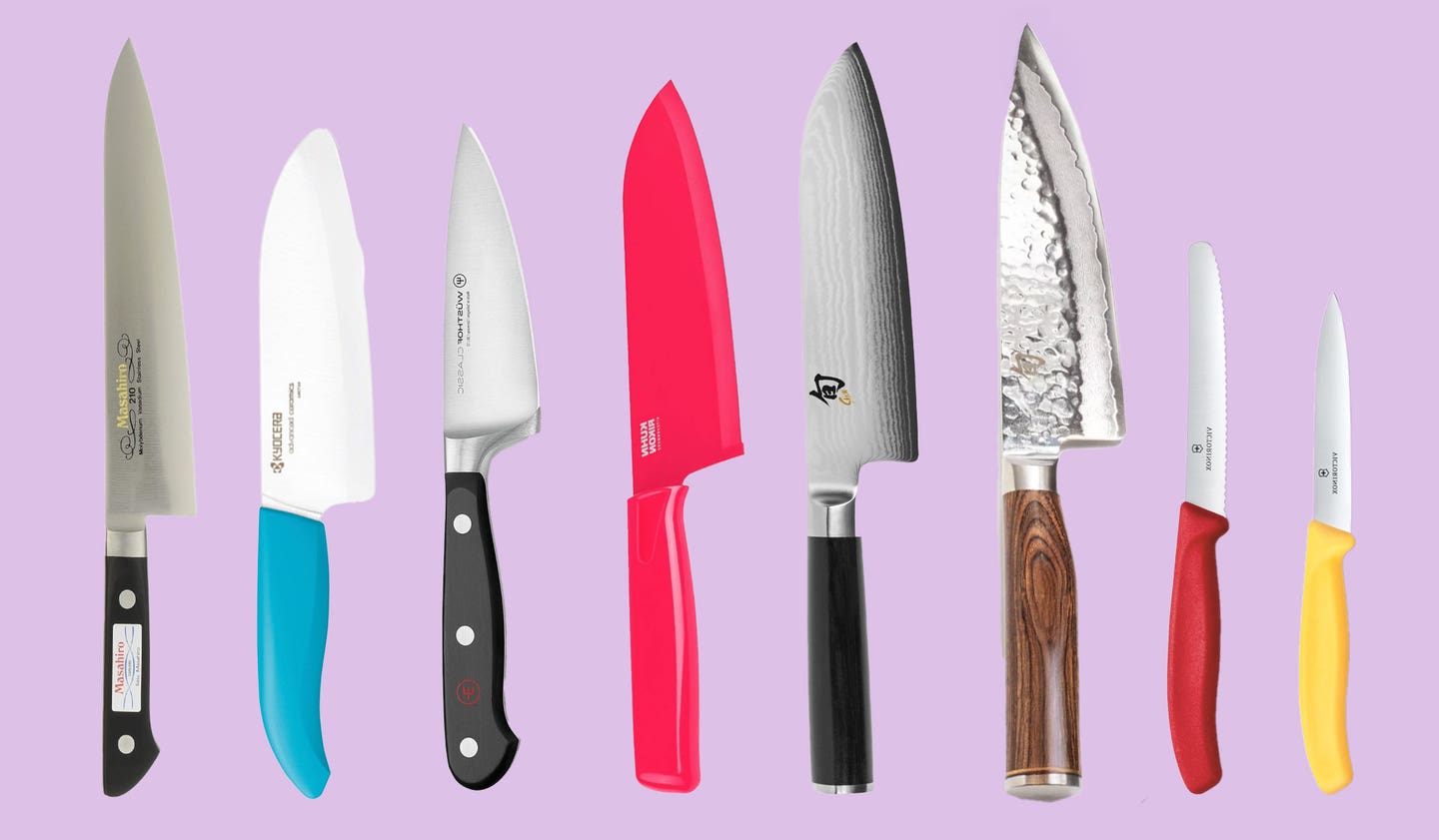
The Knives Plant-Based Chefs Can’t Live Without
Cooking delicious plant-based meals doesn’t have to mean spending hours in the kitchen—but it does usually mean spending some time with a knife in hand, chopping, slicing, dicing, peeling, trimming, scraping, coring, pulling the tops off strawberries, digging the eyes out of potatoes … you get the idea!
The right knife makes meal prep faster, easier, and way more enjoyable. We asked some of our favorite chefs and cooks two simple questions: What knife brings you joy—and why? Read on to find out which knives made the cut.
Victorinox Swiss Classic Serrated Paring Knife (Pointed Tip) | $9 at Amazon
Cookbook author and plant-based cooking instructor Linda Tyler says it’s hard to choose a favorite knife—“akin to choosing a favorite child!”—but she’s thrilled with the newest addition to her collection: a serrated paring knife, made by the same Swiss company behind the original Swiss Army Knife. “It’s the perfect size for smaller jobs that chef’s knives just don’t handle as well,” she says, citing everything from slicing bananas for smoothies to gliding through tomatoes, trimming mushrooms, chopping tempeh or seitan strips, and making a single-serve fruit salad. “For such an unassuming little knife,” she says, “it’s become surprisingly indispensable.”
Victorinox Paring Knife Set | $18 at Amazon
Also a fan of Victorinox’s small serrated knives is longtime plant-based advocate and co-author of The Prevent and Reverse Heart Disease Cookbook, Ann Esselstyn. Her all-time favorite has a round head and was a gift from Char Nolan, a fellow plant-based chef. “I also have the same small knife with a pointed top, which is useful with its sharp tip. I like them both for cutting things like strawberries, making clean cuts when slicing sandwiches, even for chopping small amounts of greens.” Esselstyn keeps hers within arm’s reach—“always somewhere on the counter if not on the magnetic board”—and never puts them in the dishwasher.
Mercer Culinary Millennia 8-Inch Chef’s Knife | $19 at Amazon
At less than $20, the Mercer Culinary Millennia 8-Inch Chef’s Knife is another steal and is the favorite knife of cookbook author and whole-food, plant-based (and gluten-free!) chef and food blogger Ashley Madden, who says she first started using it in culinary school more than 10 years ago. “I love it because the blade is really versatile,” Madden says. “I use it for everything from slicing vegetables to chopping herbs to breaking down big squash. It stays sharp and is easy to hone.”
Dreamfarm Scizza | $29, now $25 at Amazon
When asked about her favorite knife, best-selling vegan cookbook author Dreena Burton surprised us with a twist: “One of my very favorite cutting utensils isn’t a knife, but scissors—to be exact, Scizza pizza scissors!” Burton says the handy tool works better than a pizza wheel for slicing up pies, and it’s designed for serving, too. “I also use mine for flatbreads, tortilla pizzas, and homemade focaccia.” We love hearing this rave review of Scizzas, which, coincidentally, were also featured in our pizza tools guide.
Kuhn Rikon Chef’s Knife | $25, now $20 at Amazon
A pioneer of modern vegan cooking and author of seven cookbooks, Isa Chandra Moskowitz is a big fan of the Kuhn Rikon Chef’s Knife. “It’s light, comfortable, and gives me so much control that I often reach for it over my fancy high-end knives. It just fits like a glove,” she says. “I love that the blade can be sharpened, and even though it’s inexpensive, it doesn’t feel cheap. At the same time, I’m never precious about it—if something happens, I can just replace it.” While she says it’s not ideal for hacking through dense foods such as butternut squash, she calls it her “go-to for everyday cooking,” and adds that “it also comes in pretty colors, which makes cooking a little more fun—and that’s important.”
Kyocera’s 5.5-inch Ceramic Santoku Knife | $60 at Amazon
Chef Darshana Thacker Wendel, author of multiple cookbooks and creator of hundreds of FOK recipes, swears by her Kyocera ceramic knives, especially the Santoku and paring styles. “What I love about these knives is that they’re super sharp and stay that way,” she says. “They haven’t gone dull on me, even with regular use, and they don’t need to be sharpened like steel knives.” Thacker Wendel even takes them with her when she travels. Because ceramic blades can chip if handled roughly, she keeps two on hand: “If one chips, I send it for repair while I use the other. Kyocera has great customer service, and I’d rather take the chance with a delicate but super sharp knife that’s a joy to use.” They come in a range of colors.
Wüsthof Classic 4½-inch Cook’s Knife | $105 at Amazon
Vicki Brett-Gach—plant-based culinary instructor, certified personal chef, and founder of Ann Arbor Vegan Kitchen—favors the Wüsthof Classic Cook’s Knife. “Because of its shorter blade, it’s balanced, comfortable, and easy to manage with smaller hands,” she says. “I think of it as ‘small but mighty’ because it makes quick work of everyday chopping—when a longer blade isn’t really required.” German-made for seven generations, the Wüsthof Classic is a reliable, mid-range knife that offers both quality and comfort.
Masahiro MV Gyutou 8-inch Knife | $123 at Amazon
Brandi Doming, creator of The Vegan 8 is all about simple, healthy cooking. When asked about her favorite knife, she chose the Masahiro MV Gyutou Chef’s Knife. “It’s a beautiful, high-quality chef’s knife,” she says. “It’s a bit pricey, but worth the investment. It’s Japanese-made, and I especially love it for its superior slicing skills. When I’m cutting vegetables, they don’t stick to the sides of the knife like they often do with [other] knives.”
Shun Classic 7-inch Santoku Knife | $130 at Amazon
Chef Jason Wyrick, the executive chef and founder of The Vegan Taste, is a big fan of the Shun Santoku Knife. “I got it nearly 20 years ago—before they became passé,” he says. “It was my first really nice knife, so it has a lot of nostalgia attached to it, and it’s survived being beat up in my professional kitchen and traveling around the country teaching classes.” The santoku, a Japanese-style chef’s knife designed for slicing, dicing, and mincing with precision, is known for its shorter, wider blade and versatile feel. “It’s my usual go-to knife, and the form fits my hand so well that I don’t get wrist fatigue when I’m busting through cases of produce,” he adds.
Zwilling Pro 8-inch Chef’s Knife | $165 at Zwilling
For everyday cooking, plant-based culinary instructor and Plants-Rule creator Katie Simmons turns to her Zwilling 8-Inch Chef’s Knife ($165 at Zwilling), which she calls “perfect for most home cooks.” Heavier and durable, it handles sturdy vegetables like butternut squash and carrots with ease. “If I were recommending a knife for beginners or as a gift, this would be it,” she says. The model is also the knife of choice for Joanne Lee Molinaro, James Beard Award–winning cookbook author, TikTok star, and creator of The Korean Vegan. An important note from Simmons: “If you’re going to spend $100 on a knife, spend $5 on a guard—it keeps the blade sharper longer, protects little hands, and makes it easy to travel with.”
Shun Premier Chef’s Knife | $275, now $176 at Sur la Table
Author of numerous bestselling whole-food, plant-based cookbooks—including The Forks Over Knives Cookbook and The China Study Quick & Easy Cookbook—Chef Del Sroufe says the versatility of a chef’s knife makes it his favorite. “It can handle everything from slicing veggies to chopping herbs and even cutting through larger items,” he says. When it comes to choosing a brand, Sroufe favors Japanese-made Shun knifes. “The Shun brand stands out for its craftsmanship and beautifully balanced feel,” he adds. “It’s a joy to use for long cooking sessions, and it stays sharp over time.”
For plant-based cooks, a great knife might just be the best investment you can make, because when prep feels easy, eating plants feels effortless. So find your perfect knife, and start chopping.

About the Author

About the Author
Lisa Esile, MS
Join our mailing list
Get free recipes and the latest info on living a happy, healthy plant-based lifestyle.
By providing your email address, you consent to receive newsletter emails from Forks Over Knives. We value your privacy and will keep your email address safe. You may unsubscribe from our emails at any time.